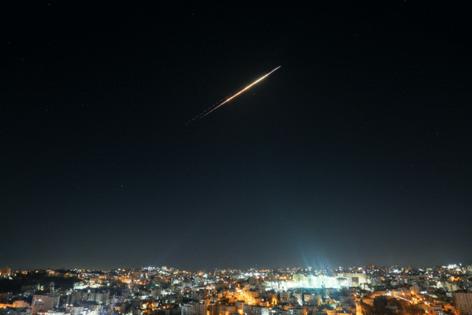Marc Champion: How bombing Iran can set back non-proliferation
Published in Op Eds
President Donald Trump seems on the cusp of ordering B2 bombers to join Israel’s assault on Iran’s nuclear program. It could all be a bluff, of course, but I suspect Israeli Prime Minister Benjamin Netanyahu knew his man.
The appeal of being the U.S. president who finally ended the threat of a nuclear-armed Iran – as opposed to the one who Taco’d out of helping Israel to get there – will be strong.
Should that happen, Iran’s Supreme Leader Ali Khamenei will have multiple options: He could attack U.S. bases, set Saudi oil refineries ablaze or close the Strait of Hormuz. Or, he could do nothing, hoping to avoid an all-out war he could never win. He might cut a new deal, abandon nuclear enrichment or build new enrichment cascades even deeper underground and dash for a bomb. Such are the unknowns that can produce the forever wars that nobody ever intends.
The one thing that does seem clear, however, is that the Israeli and now potentially U.S. decision to bomb a threshold nuclear power to its knees will have significant implications for arms proliferation.
The optimistic case is that those B2s fly the roughly 7,000 miles from their base in Missouri to drop 30,000 pound (13,600 kilogram) Massive Ordnance Penetrator bombs on Iran’s deeply buried uranium-enrichment facility, at Fordow, near the holy city of Qom, and obliterate it. With Israeli jets already taking care of less hard-to-reach targets, and assuming no secret factory gets missed, the Islamic Republic would have to restart its uranium-enrichment program from scratch.
That should dissipate or at least postpone the risk of a regional arms race. For if Iran doesn’t have a nuclear arsenal, there’d be no imperative for Saudi Arabia or Turkey to get one, too. At least, that’s among the key justifications for taking military action that proponents in Washington and Israel have long made.
Israel has its own reasons for preventing Iran from getting the ultimate weapon, which would pose an existential threat in implacably hostile hands. That doesn’t apply for the U.S. Its interests are more focused on these regional proliferation calculations — a difference that may help explain the reluctance of successive American presidents to back Israeli plans for airstrikes.
But a more positive regional outcome is hardly guaranteed. It isn’t just that the MOPs could fail to blast through a mountain to the cascade chambers at Fordow, leaving Iran’s neighbors to assume the worst — that the regime would dash for a bomb to ward off future attacks. That’s especially true if Iran should, as some officials have threatened, kick out international inspectors and withdraw from the 1968 Treaty on the Non-Proliferation of Nuclear Weapons, or NPT.
A less cheering interpretation is that no matter how successful the attack, it will reinforce for governments around the world the lesson that a working nuclear arsenal protects you from getting bombed or invaded. That was illustrated by Libya in 2011, Ukraine in 2022, and now Iran in 2025. Iran’s fellow pariah state North Korea, meanwhile, remains free to taunt the U.S. and its allies, because it already has the bomb.
There’s a bigger trend and context to this scenario, because the NPT looks increasingly like a document from an earlier era. It’s going to lose potency as we move from a rules-based order to one in which stronger countries assert their perceived national interests, regardless of international laws and treaties.
This is the world in which China, in 2016, simply dismissed international arbitration that rejected its claims to own the South China Sea and all islands within it, up to an imaginary “nine-dash line.” It’s the world in which Russia claims a right to invade Ukraine in breach of multiple treaties and agreements, and is willing to threaten a nuclear strike in pursuit of this territorial conquest. Meanwhile, the main architect of the rules-based order, the U.S., is now declaring intentions to take over Canada, Greenland and the Panama Canal.
Arms control, too, looks out of fashion. China’s adding 100 warheads to its arsenal each year, while most of the established nuclear powers have announced programs to update or expand theirs. New Start, the only remaining nuclear arms-control treaty is due to expire next year and there’s no sign of any negotiations to renew it.
In this environment, it becomes increasingly appealing to have your own nuclear weapons. What else could protect against apex predators such as China, Russia and the U.S.? Or from the regional hegemon that Israel is fast becoming?
“Some will bandwagon with stronger states while others may decide to balance with the only truly powerful asset, nuclear weapons,” Nikolai Sokov, a nuclear negotiator (for Moscow) during the Cold War and now senior fellow with the Vienna Center for Disarmament and Non-Proliferation, told me. “We are talking years, of course, so neither Trump, nor Netanyahu will be answerable or will have to deal with consequences.”
Should Trump decide to join Israel in bombing Iran’s fuel-enrichment facilities (another first), it may well have no discernible short term effect on proliferation. Added together, the world’s nuclear arsenals already store 14,000 times the power of the one dropped on Hiroshima, and that figure is rising all the time. But while setting back one nuclear program, the attack on Iran will very likely add to a gathering momentum for more.
_____
This column reflects the personal views of the author and does not necessarily reflect the opinion of the editorial board or Bloomberg LP and its owners.
Marc Champion is a Bloomberg Opinion columnist covering Europe, Russia and the Middle East. He was previously Istanbul bureau chief for the Wall Street Journal.
_____
©2025 Bloomberg L.P. Visit bloomberg.com/opinion. Distributed by Tribune Content Agency, LLC.

























































Comments